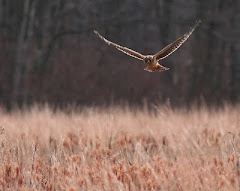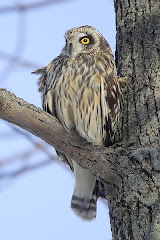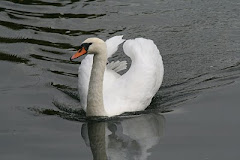
An owl
shouldn’t do that – not a wild barn owl! It was a sunny afternoon in
mid-September, and the fully fledged youngster landed just 2 metres away from
me as I was tidying up the river bank in front of the house, a tricky job at
the best of times. I guessed it was one of the second brood that had
been raised in our owl box, against all the odds given the poor summer we’d
had.
I’d taken
a keen interest in the development of this young family, and they’d provided
considerable entertainment at a barbecue in early August. Family and friends
had taken turns to visit the shed to view their antics on a TV I’d connected to
a nest box camera in the garage. It had not been good owl watching weather in
the open though, and as I was now back at work I’d seen very little of them or
their parents during recent weeks. I should have realised that poor owl
watching weather was poor hunting weather too.
The owl on
the river bank looked at me and blinked, and after about 20 or 30 seconds took
off and flew weakly over the surface of the river, before settling clumsily on
the far side, about 6 metres away, wings spread out, one on the bank and one on
the surface of the water. What should I do?
Would it
be able to climb up the bank? My indecision was short-lived. One of the local
moorhens, currently tending at least its third brood of the summer, launched
into a ferocious attack, legs extended in front of it. The hapless young owl
drifted slowly away from the bank, supported as much by the thick covering of
weed as the buoyancy of its own body. The plucky moorhen had made up my mind
for me – I rushed over the bridge, scrambled through the nettles and down the
bank, and lowered myself into 4 feet of weed, mud and water. As I scooped my
hands under the young bird, and lifted it clear of the water, the cause of its
problems was immediately obvious.
Beneath
the beautiful plumage was little more than a skeleton – I could barely feel any
flesh. Even on its chest its pectoral muscles, essential for flight, were
wasted through lack of food. Maybe the parents had been unable to find
sufficient food during a wet and cold late summer, or maybe the young owl
itself had failed to provide for itself. Whatever the cause, it was clearly too
weak to hunt, and after a couple of hours in a cardboard box on top of a hot
water bottle, it died.
Lifting the cold, lifeless body out of the box, and wiping off some of the mud and weed, marked the lowest point of what had been a miserable summer. Maybe its siblings had had a more successful start to life, and perhaps next summer would be better for owl breeding. I could only hope.

















.jpg)
























No comments:
Post a Comment